Tony Eldridge's Blog, page 16
June 5, 2011
Sunday Kindle Book Giveaway AM: Mrs. Lieutenant By Phyllis Zimbler Miller
[image error]
Welcome to the first ever Sunday Kindle Book Giveaway. This is your opportunity to discover new authors and books each Sunday while having a chance to win a copy of the Kindle version of the books directly from the authors. All you have to do for your chance to win is leave a comment below.
To kick us off today is the author of Mrs. Lieutenant; A Sharon Gold Novel , Phyllis Zimbler Miller.
, Phyllis Zimbler Miller.
Description From Amazon.com
Four young women follow their husbands to officers' training school with little certainty about their social standing and even less about their husband's futures in this story set three years after the summer of love. Kim, Wendy, Donna, and Sharon have everything in common except their backgrounds. As a Jew, a black, a Puerto Rican, and a white southern woman, they make a convenient test case for friendship by default. Sharon, who grew up part of "an imagined, if not actual majority" is the most confident of the group, but struggles with being connected by marriage to "the war machine." Donna has already lost one husband to Vietnam and fears for her second. Wendy considers leaving her husband rather than lose him in combat, and Kim's orphaned youth has colored her judgment about her "white knight" of a jealous bigoted husband. Over the course of three months, the women share secrets and etiquette lessons, which are excerpted from the army-issued "Mrs. Lieutenant" booklet at the head of each chapter. The summer ends with one climactic event , underplayed by a mundane parting of ways by four friends. This slow-moving drama about picnics, diaphragms, and head-patting husbands may be an accurate depiction of the social milieu of Fort Knox in 1970 - but that isn't enough to sustain readers' attention. -- manuscript review by Publishers Weekly, an independent organization
Find Phyllis on Facebook: www.facebook.com/millermosaicsocialmedia
Find Phyllis on Twitter: @ZimblerMiller
Phyllis's Blog: Miller Mosaic Social Media Marketing
Reviews
Amazon
Other Reviews
Message From The Author
While May of 1970 right after the Kent State shootings during the Vietnam War may seem a long time ago, the stories of the four new officers' wives in the novel MRS. LIEUTENANT have a great deal to say to today's world. For people who have no experience with the world of the military as well as those who do, the fears and hopes of these very different women resonate in 2011.
For your chance to win a Kindle copy of Mrs. Lieutenant; A Sharon Gold Novel, all you have to do is leave a comment below. We will randomly choose a winner next Saturday.
From Our Sponsors
Ebook Friendly - discover Kindle ebooks in a distraction-free environment. Tips, news, bestseller lists and more.
Time to publish your thoughts? www.taleist.com
--------
--------
Tony Eldridge is the author of The Samson Effect , an action/adventure novel that Clive Cussler calls a "first rate thriller brimming with intrigue and adventure." He is also the author of the Twitter marketing book, Conducting Effective Twitter Contests . His new novel, The Lottery Ticket , was just recently released on Kindle.








To kick us off today is the author of Mrs. Lieutenant; A Sharon Gold Novel
 , Phyllis Zimbler Miller.
, Phyllis Zimbler Miller. Description From Amazon.com
Four young women follow their husbands to officers' training school with little certainty about their social standing and even less about their husband's futures in this story set three years after the summer of love. Kim, Wendy, Donna, and Sharon have everything in common except their backgrounds. As a Jew, a black, a Puerto Rican, and a white southern woman, they make a convenient test case for friendship by default. Sharon, who grew up part of "an imagined, if not actual majority" is the most confident of the group, but struggles with being connected by marriage to "the war machine." Donna has already lost one husband to Vietnam and fears for her second. Wendy considers leaving her husband rather than lose him in combat, and Kim's orphaned youth has colored her judgment about her "white knight" of a jealous bigoted husband. Over the course of three months, the women share secrets and etiquette lessons, which are excerpted from the army-issued "Mrs. Lieutenant" booklet at the head of each chapter. The summer ends with one climactic event , underplayed by a mundane parting of ways by four friends. This slow-moving drama about picnics, diaphragms, and head-patting husbands may be an accurate depiction of the social milieu of Fort Knox in 1970 - but that isn't enough to sustain readers' attention. -- manuscript review by Publishers Weekly, an independent organization
Find Phyllis on Facebook: www.facebook.com/millermosaicsocialmedia
Find Phyllis on Twitter: @ZimblerMiller
Phyllis's Blog: Miller Mosaic Social Media Marketing
Reviews
Amazon
Other Reviews
Message From The Author
While May of 1970 right after the Kent State shootings during the Vietnam War may seem a long time ago, the stories of the four new officers' wives in the novel MRS. LIEUTENANT have a great deal to say to today's world. For people who have no experience with the world of the military as well as those who do, the fears and hopes of these very different women resonate in 2011.
For your chance to win a Kindle copy of Mrs. Lieutenant; A Sharon Gold Novel, all you have to do is leave a comment below. We will randomly choose a winner next Saturday.
From Our Sponsors
Ebook Friendly - discover Kindle ebooks in a distraction-free environment. Tips, news, bestseller lists and more.
Time to publish your thoughts? www.taleist.com
--------
--------
Tony Eldridge is the author of The Samson Effect , an action/adventure novel that Clive Cussler calls a "first rate thriller brimming with intrigue and adventure." He is also the author of the Twitter marketing book, Conducting Effective Twitter Contests . His new novel, The Lottery Ticket , was just recently released on Kindle.








Published on June 05, 2011 04:00
June 3, 2011
Resource Of The Week: PayPal
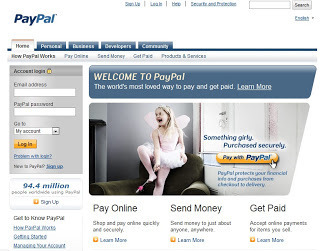 Today's resource of the week is actually a huge tool that you no doubt have heard of: PayPal. For authors with a book or product you want to sell online, this is a resource worthy of your consideration.
Today's resource of the week is actually a huge tool that you no doubt have heard of: PayPal. For authors with a book or product you want to sell online, this is a resource worthy of your consideration. Paypal has different levels of service it can offer you that makes it a wonderful shopping cart alternative to those costly options that siphon cash on a monthly basis. With PayPal, you can set up a shopping cart feature that allows your readers to purchase your product securely and easily.
I have used Palpal to set up a digital product, like my PDF/Video version of Conducting Effective Twitter Contests that collects the payment, delivers the download instructions and then notifies me of the purchase. But I've also used PayPal to take orders for books that people wanted me to sign for them. Whether it is a physical product or a digital download, PayPal always does a great job.
And with PayPal, your customers can choose to pay by credit card without any additional gateway setup on your end. You have no monthly payment requirements to use PayPal and they take a reasonable small percentage of the sale to make their service available to you.
Of course, depending on your volume, it may make sense to go another route for your shopping cart, but for a reasonable service with no up-front or monthly fees, and one that's very easy to implement on your site, check out PayPal.
Last 4 Resources Of The Week
Google's Call Me Widget
Paint.Net
MobiPocket Ebook Creator
YouTube's Creator's Corner
--------
Tony Eldridge is the author of The Samson Effect , an action/adventure novel that Clive Cussler calls a "first rate thriller brimming with intrigue and adventure." He is also the author of the Twitter marketing book, Conducting Effective Twitter Contests . His new novel, The Lottery Ticket , was just recently released on Kindle.








Published on June 03, 2011 23:53
Book Marketing Strategies And Tips Around The Net: June 3rd
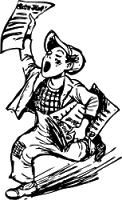 It's Friday, and that means it's time for our trip around the net to look at the posts that have caught my eye. We have some great tips on tap as well as posts to keep us up on our industry.
It's Friday, and that means it's time for our trip around the net to look at the posts that have caught my eye. We have some great tips on tap as well as posts to keep us up on our industry. This week, my wife is on vacation, so I have spent a lot of time with the family, including a trip to the Dallas Zoo where my boys got to feed a giraffe. How cool is that? While I may be behind on my e-mails, a lot has happened this week. The Samson Effect
 hit #2 on Amazon's Bestsellers in Men's Adventure Fiction list and I'm coming out with a new novel today on Kindle called, The Lottery Ticket
hit #2 on Amazon's Bestsellers in Men's Adventure Fiction list and I'm coming out with a new novel today on Kindle called, The Lottery Ticket . Keep your eyes out for it.
. Keep your eyes out for it.Also, this Sunday begins our Sunday Kindle Book Giveaway. This is your chance to win free Kindle titles directly from the authors. We had so many authors who wanted to participate, we had to close submissions in less than a week to keep the backlog from stretching over a year. We'll reopen submissions in a few months, so if you have a book you want to participate, keep your eyes opened for the opportunity.
Now, grab your favorite beverage and settle in for some great tips from the experts...
1. The day Amazon.com asked me to close my website- Steven Lewis rolls out big news about his site in a textbook example of how to make lemonade out of lemons. In a world where people often choose to look at the half-empty glass, Steven shows us that our reaction to unexpected challenges can be a positive force in our own marketing plans.
2. Should You Design Your Own Book? Pro and Con- Joel Friedlander gives spot-on advice for authors with a book in them just waiting to come out.
3. Publishing Insiders Wrap-Up: What Authors Must Know About Book Cover Design- Penny Sansevieri discusses elements of a great book cover with Jeniffer Thompson.
4. 6 Reasons Why You Need to Publish Ebooks- Dana Lynn Smith gives you some reasons to publish ebooks that you may not have considered.
5. Authors – Have You Tried This Little Known Online Marketing Book Strategy? @ShelleyHitz- Dvorah Lansky invites Shelley Hitz to talk about how guest blogging can be a one of your most effective marketing tools.
6. Independent bookstores say weaker chains strengthen their business – NOLA.com- Steve Weber talks about good news for the the independent bookstores.
7. Facebook Groups Scheduled to Get New Format- Phyllis Zimbler Miller keeps us up on the new Facebook changes. Again.
8. Publishing On The Kindle: Top Tips- Joanna Penn brings back her video that she created for this site at the launch of her novel, Pentecost. A Thriller.
 . She shares excellent tips for authors about publishing on the Kindle format.
. She shares excellent tips for authors about publishing on the Kindle format.9. 7 reasons all writers should have a blog- Sue Collier shares her reasons why you need a blog.
10. Oldest Agency Publisher Cuts Deal- Dean Wesley Smith delivers another industry commentary worth your consideration.
11. Ebooks and Self-Publishing Part 3 - Yet Another Dialog Between Authors Barry Eisler and Joe Konrath- If you haven't heard these two powerhouses discuss our industry, then you're missing out. Joe Konrath and Barry Eisler are talking again.
12. How to Effectively Publish and Promote Your Books to iPad and iPhone Users-
13. Book Trailers Are More Important Than Ever- BookBuzzr invites Phyllis Zimbler Miller to discuss why book trailers are important to your book marketing plan.
14. Help me choose the right book cover for my new writer's workbook- Roger C. Parker has a new book coming out and wants you to help choose the cover for it.
15. Contract Red Flag: Net Profit Royalty Clauses- Victoria Strauss continues to educate authors on what to watch for when signing a contract for a book deal.
16. How to Format Blog Posts Effectively- Darren Rowse gives you simple, but effective tips on formatting your blog post.
17. How to Embed Facebook Videos- Quick Online Tips gives you step-by-step instructions on how to embed Facebook videos on your site.
18. The Best Writing Apps for Writers- Nick Daws shares some cool tools and toys for authors.
19. How I Gained 3,500 Subscribers in 12 Months- Daniel Scocco invites Henri Juntila to share how he picked up 3500 subscribers in a year.
Well, that's it for this week's trip around the net. I look forward to seeing you bright and early tomorrow morning with a new resource of the week and then on Sunday with your chance to win a new Kindle book from its author. Enjoy your weekend.
-------- Tony Eldridge is the author of The Samson Effect , an action/adventure novel that Clive Cussler calls a "first rate thriller brimming with intrigue and adventure." He is also the author of the Twitter marketing book, Conducting Effective Twitter Contests .








Published on June 03, 2011 08:36
June 2, 2011
Speaking Engagements - Be Prepared By L. Diane Wolfe
 Today, I'm thrilled to bring back a returning expert to this blog. L. Diane Wolfe is an author and professional speaker. She has a blog called Spunk On A Stick Tips where she shares her tips with readers and writers. In today's post, Diane will give us a checklist of everything we'll need to make sure our next speaking engagement goes off without a hitch.
Today, I'm thrilled to bring back a returning expert to this blog. L. Diane Wolfe is an author and professional speaker. She has a blog called Spunk On A Stick Tips where she shares her tips with readers and writers. In today's post, Diane will give us a checklist of everything we'll need to make sure our next speaking engagement goes off without a hitch. Speaking Engagements - Be Prepared
By L. Diane Wolfe
Speaking is the next step in the evolution of an author. From casual gatherings of writers and readers to professional meetings of organizations and businesses, opportunities will arise. While the atmosphere and settings may all be different, one thing remains the same - an author needs to prepare!
Here's a checklist for the next time you acquire a speaking gig:
- Market the event. Don't rely on your host to do it all. List the event in all media sources, do interviews, send out a media release, send out invitations - whatever it takes.
- Be sure you and the host are on the same page. Confirm the topic, the angle of your talk, and the length. If it's a paid speaking engagement, be sure you both agree on the fee and take an invoice.
- Know the group to whom you are speaking. Do some research. You'll feel more comfortable speaking if you know a little of the group's history and can relate on some level.
- Be sure your host can accommodate if you have a display or require technical equipment. Nothing worse than arriving with a power point presentation and no way to show it!
- Practice your talk. You'll be less nervous if you're familiar with your words. Remember to infuse enthusiasm into your talk.
- Confirm time and location. You don't want to arrive late. Or at the wrong venue. Or on the wrong date!
- Prepare your visuals and props. Remember to take bookmarks, business cards, books, and change for those who purchase a book. Don't forget your notes! Or a change of clothing if you tend to be klutzy.
- Arrive at least thirty minutes early. This gives you time to meet the host, set up your material, and test equipment. (Would you rather discover your power point doesn't work before or during your talk?)
- Smile! Whether you're socializing with attendees or sitting and gathering your thoughts, don't forget to smile. You can't be worried while smiling.
- During your talk, be prepared for anything! You might be asked to speak longer or shorter than originally planned. If you lose your place, just skip ahead and keep going. (After all, the audience doesn't have your notes - they won't know!) If someone interrupts, get back on track quickly. Be prepared for questions and only provide answers that feel comfortable.
- Finally, thank the host before leaving and send a written thank you card when you get home.
If you follow this checklist, you'll approach all speaking engagements with confidence. And you'll be prepared!
--------
L. Diane Wolfe
Professional Speaker & Author
www.spunkonastick.net www.thecircleoffriends.net
http://www.circleoffriendsbooks.blogspot.com
Known as "Spunk On A Stick," Wolfe is a member of the National Speakers Association. "Overcoming Obstacles With SPUNK! The Keys to Leadership & Goal-Setting", ties all of her goal-setting and leadership seminar's information together into one complete, enthusiastic package. She also conducts seminars on book publishing and promoting, and assists writers through her author services. Her YA series, The Circle of Friends, features morally grounded, positive stories that appeal to both teens and concerned parents. Ten years associating with a motivation training system and experience as a foster parent gave her the in-depth knowledge of relationships, personality traits and success principles. Wolfe travels extensively for media interviews and speaking engagements, maintains a dozen websites & blogs, and contributes to several other sites and newsletters.
Related Posts
The Writer's A-Z Challenge by L. Diane Wolfe
Professional Speaking as a Promotional Tool by L. Diane Wolfe
Tips From A Road Warrior by L. Diane Wolfe
Touring in a Virtual World By L Diane Wolfe
-------- Tony Eldridge is the author of The Samson Effect , an action/adventure novel that Clive Cussler calls a "first rate thriller brimming with intrigue and adventure." He is also the author of the Twitter marketing book, Conducting Effective Twitter Contests .








Published on June 02, 2011 04:00
June 1, 2011
7 Traffic Stats You Should Know About Your Blog Or Website
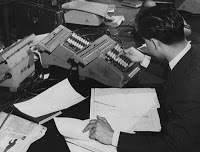
Image Via Wikipedia
Chances are, when you started your blog or website, you had no clue about page views, bounce rates, unique visitors or what those numbers would mean to you. That's understandable. But unless you pay a techie to manage your website, sooner or later you'll want to know the things about your site that those numbers can tell you. In today's post, I'll cut through the clutter and share my own personal views of what numbers you need to know about your site and why they are important to you.
I know that there will be some webmasters who really get into this stuff that will say, "Are you nuts? How can you not include XYZ stats in your list?" I get that. Personally, I get into the stats thing more than I really should and I follow some pretty obscure numbers. But while I see some value in other stats, these are the ones that I would want to know as a bare minimum to help me understand how my site is performing and what areas I need to focus on to make it perform better. That said, here are the top 7 traffic stats that I think you should know about your blog or website and why.
1. Unique Visitors- When you start to follow the stats of your site, you'll see a kazillion stats that measure visitors, each reflecting a nuanced measurement of the people who visit your site: visitors, unique visitors, visits, new visitor, returning visitor, and the list goes on and on. I like to look at unique visitors when I study my stats because it tells me how many individuals have visited my site during a specific time range. If you were throwing a party, this number would tell you how many people showed up.
The reason this is important is that you can get a feel for the number of people interacting with your site at any given time. And remember, just because 1000 people visit your site from time to time, they will not all visit on the same day. You may average 200 unique visitors per day, but some will visit every day, while others will visit once a week.
2. Percentage Of New Visits- This stat tells you how many of your visitors have not been on your site before. I know that this number is not 100% accurate for a lot of reasons, but it will still give you an idea of whether new people are finding your site or if your site is primarily being visited by the same people over and over.
The reason this is important is that you'll have an idea of whether your site is growing or dying. If the percentage of new visits starts to decline, then you'll know you have to work on marketing your site more to make sure new people are finding it. This is one of my favorite stats to monitor on my site.
3. Page Views- There are a lot of nuanced ways you can also measure page views, but most tracking tools use this stat to tell you how many times your html page has been requested to load. It's also often called an impression. So, on my blog, if you click on 4 posts to read, my stats counts that as 4 page views (this is a simplistic explanation of what really has a more technical answer).
The reason this is important is because it lets you know how robust your website traffic is... to an extent. If your site has 20,000 page views per month, then you know how many times a page on your site has been clicked. This is an important number that advertisers use to determine how much an ad should cost on a website, though by no means the only number.
4. Page Views Per Visits- This stat tells you, on average, how deep into your site visitors go. Do they look at just one page and then move on to another site or do they click through to other pages on your site. If you have 1000 visits and 1500 page views, then you're averaging 1.5 page views per visit.
This is an important number to watch. If it goes down, that may be an indication that you're not positioning your information in a way to encourage people to click other links on your blog. It may also be that you're not presenting them with other information they think is useful. On the other hand, it that number goes up, it's an indication that your site is doing a good job at making interesting information easy to find on your site.
5. Bounce Rate- Bounce rate measure how many people come to your site and then leave without clicking on anything else. On my blog, someone may come over because of a tweet, but if they read the post and then go back to Twitter, then it's a bounce. However, once they're here, if they see another post that looks interesting and they click on it, then it's not a bounce. So, if 100 people come to my blog and 38 of them go to Google after reading the post while the other 62 read another post on my blog, my bounce rate would be 38%.
The reason this is important is that it gives you an indication of how "sticky" your blog is. By providing good information to your visitors and making that information easy to find, you'll increase your "stickiness" and decrease your bounce rate.
6. Time On Site- This stat tells you how long people spent on your site before clicking away. If someone came in from Google and spent 10 seconds on your site before going back to Google, chances are they realized that your site wasn't what they were looking for. However, if you have posts, audio, or video on your site that people find interesting and valuable, they will spend more time on the site to see what you're saying.
The reason this is important is that it can tell you how engaging your content is. If you're getting 2000 people in from Google, but they are only staying 10 seconds, then you know that they are not finding what they are looking for. But the more they click around and explore, the more time they will spend on your site.
7. Traffic Source- This stat tells you where your visitors are coming from. You may have 30% coming from Twitter, 15% coming from Google, 23% coming from my blog, and 20% coming from StumbleUpon. By keeping an eye on your traffic sources, you'll start to get a feel on what's working and what's not working in your marketing plan.
The reason this is important is that you'll know where you might be spinning your wheels and you can focus more on developing new traffic sources or fortifying the sources that are working for you already.
This is a simplistic look at what can be a very detailed study. But for the author who doesn't want to become a webmaster but still wants to understand enough about their traffic to make good marketing decisions, these 7 traffic stats are a great place to start. Once you understand these, then you can look at the other fun stats, like entrance/exit pages, geotargeting stats, loyalty, regency, depth of visits, and on and on. While there are many places to find these stats, Google Analytics is one of my favorite. It's robust on its reporting and it's free.
Related Posts
8 Ways To Track Your Website and Blog's Traffic
Costly Pitfalls To Avoid When Setting Up Your Website: Q&A With MaAnna Stephenson
Content Creation is Vital in Successful SEO by R. Kyle Michael
Why Visitors Leave Your Site And What To Do About It By Conrad Feagin
-------- Tony Eldridge is the author of The Samson Effect , an action/adventure novel that Clive Cussler calls a "first rate thriller brimming with intrigue and adventure." He is also the author of the Twitter marketing book, Conducting Effective Twitter Contests .








Published on June 01, 2011 04:00
May 31, 2011
How Many Books Do I Have to Sell to Make My Book a Bestseller? By Trissa Tismal
 Today's guest, Trissa Tismal, is the "EntreprenAuthor" success coach who works with authors to help their books become bestsellers. She is a trained professional coach in many areas and the professional behind www.AuthorBestseller.com . Today, Trissa will be talking about book sales and best seller status.
Today's guest, Trissa Tismal, is the "EntreprenAuthor" success coach who works with authors to help their books become bestsellers. She is a trained professional coach in many areas and the professional behind www.AuthorBestseller.com . Today, Trissa will be talking about book sales and best seller status. Before we get our guest's post, I want to take this time to thank everyone for your support of the Kindle release of my novel, The Samson Effect
 . Thanks to you, it's had a better month than I could have imagined. It's humbling to see it pass NY Times best selling authors on the Amazon best seller lists. From the bottom of my heart, thanks for your support.
. Thanks to you, it's had a better month than I could have imagined. It's humbling to see it pass NY Times best selling authors on the Amazon best seller lists. From the bottom of my heart, thanks for your support.Now, on to our guest post for today...
How Many Books Do I Have to Sell to Make My Book a Bestseller?
By Trissa Tismal
Becoming a bestseller is the ultimate dream of every author. Besides the fact that bestsellers make the most difference in the world, hitting this milestone comes with a lot of respect and perks.
 When you're a bestselling author, people see you as a super star. You become a highly sought-after guest on radio and TV interviews. You get featured on newspapers and magazines. Filmmakers want to turn your book into a film. You start attracting ideal high paying clients that gladly pay you what you're worth. While before you were lucky to get paid for any speaking gig, now you are able to charge $5,000 to $35,000 or more per keynote. More people learn about your work and you get a dramatic increase in your client base.
When you're a bestselling author, people see you as a super star. You become a highly sought-after guest on radio and TV interviews. You get featured on newspapers and magazines. Filmmakers want to turn your book into a film. You start attracting ideal high paying clients that gladly pay you what you're worth. While before you were lucky to get paid for any speaking gig, now you are able to charge $5,000 to $35,000 or more per keynote. More people learn about your work and you get a dramatic increase in your client base. A very common question I'm always asked is, "How many books do I have to sell to make my book a bestseller?"
When you're a bestselling author, people think that you've sold millions and millions of books around the world. Most authors think the same way too. The truth is becoming a bestseller does not equate to millions of books sold.
The bestseller's list is a ranking system. It's like the billboard top 100 list for songs or the box office movie hit for films.
An example is the box office on a weekend in July 2010. The #1 box office movie hit that weekend was the Twilight Saga: Eclipse, which grossed $83.6 million. It's number one because it sold more movie tickets than all other movies showing at that time. The number two box office hit on that same list is The Last Airbender, which sold $51.8 million.
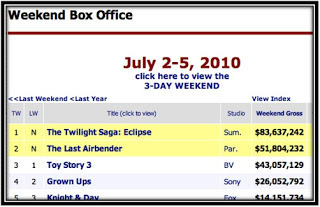
Now let's look at a weekend in March 2011. The #1 top box office movie hit is "Diary of a Wimpy Kid," which grossed at $23.7 million. In this list, Diary of a Wimpy Kid sold more than everyone else showing that weekend so it got the #1 spot. Even though in the earlier example, on the same box office list but just on a different weekend, The Last Airbender sold $51.8 million—much more than the $23.7 million of Diary of a Wimpy Kid. But the The Last Airbender got #2 spot on the first list and the Diary of a Wimpy Kid got #1 spot on the list below because the box office movie hit, like the billboard top 100 and the bestseller list is a ranking system and its not based on a specific number of sales.
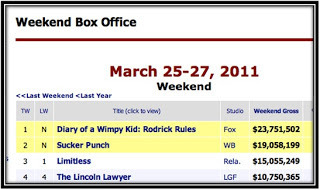
So how many books do you have to sell to become a #1 bestselling author? The answer is more than what the existing number one book is selling. If Harry Potter is currently #1 and its selling 10,000 books, then you have to sell at least 10,001 books. That will knock out Harry Potter from the number one spot and make you the #1 bestseller. The key is to push sales as high as possible so it climbs the charts and outsell every other popular book on a particular bestseller list.
Seems like a daunting task? Yes it is, IF you do it alone. My tip to you is don't even try doing this by yourself or you're be severely disappointed. A feat this huge is something that is accomplished with the help of other people. There will be challenges you will encounter along the way, but never give up. Stay connected to why your book must be in the hands of as many people as possible. Keep on going and don't let anything get in your way.
--------
Bestseller Coach, Trissa Tismal is passionate and dedicated in helping authors make their book a bestseller, make big money and make a bigger difference. To learn more about making your book a bestseller, watch the "Bestseller Insider Secrets" Video at no-charge by clicking here.
For tips, tactics and resources on making your book a bestseller, visit: www.AuthorBestseller.com
Follow Trissa on Twitter: @trissatismal
Join Our Facebook Group: Authors with a Purpose
-------- Tony Eldridge is the author of The Samson Effect , an action/adventure novel that Clive Cussler calls a "first rate thriller brimming with intrigue and adventure." He is also the author of the Twitter marketing book, Conducting Effective Twitter Contests .








Published on May 31, 2011 04:00
May 30, 2011
Q&A With The Book Designer, Joel Friedlander
 Recently, I sat down with Joel Friedlander to ask him a few questions about the book creation process. Joel has a wealth of experience working with books and bringing them to market. He is the proprietor of Marin Bookworks, a company that edits, designs and produces books for publishers and authors who decide to self-publish. You can read his popular blog, The Book Designer to learn all about the book creation and marketing process.
Recently, I sat down with Joel Friedlander to ask him a few questions about the book creation process. Joel has a wealth of experience working with books and bringing them to market. He is the proprietor of Marin Bookworks, a company that edits, designs and produces books for publishers and authors who decide to self-publish. You can read his popular blog, The Book Designer to learn all about the book creation and marketing process.Joel has a new book out, A Self-Publisher's Companion, that explains the world of self-publishing to authors thinking about getting into print or e-books. It's a book I highly endorse. You can read my review of his book on my blog.
I'm excited to bring this Q&A with Joel to you today.
1. Joel, thank you for sitting with us today and sharing your knowledge. If most authors are like I was when I wrote my first book, they really don't know what to expect when they try to get their book in print. From the standpoint of moving a book from the completed manuscript to a final copy you can hold in your hands, what do you think are the biggest surprises/challenges authors face in the self-publishing process?
Tony, that's a big question, and the space between the finished manuscript and printed books is where I've spent the majority of my career. The biggest surprise most new publishers face is the sheer number of decisions they need to make to get their book done, and the amount of expertise needed to answer those questions. Their challenge typically comes in becoming the project manager of a complex process requiring experts or training in a number of areas in order to get to the finish line.
2. Do you see any consistent mistakes that most authors make when self-publishing their book?
The biggest error I see, and not just from self-published authors, is underestimating what it will take to market and sell their books. No matter where you are in your book development--even if you are just thinking about what you want to write--start marketing today.
3. Joel, you've witnessed the ushering in of the "Golden Age" of self-publishing, as you call it in your new book, A Self-Publisher's Companion. What makes this the Golden Age of self-publishing?
These things:
-ease of acquiring the tools to publish
-eliminating the need for capital in order to publish
-opening of bookselling to self-publishers through online retailers
-development of technology that makes publishing fast, easy and almost free
4. What, if any, are the differences between how novelists approach self-publishing and how non-fiction authors approach self-publishing?
Two differences I've seen are that novelists seem to be concentrating on building a fan base and planning series of books to sell to those fans, while nonfiction writers seem to be concentrating more on attracting readers looking for solutions within their niche.
5. In the last 2 to 5 years, what would you say is the greatest technological advancement for authors who want to self-publish?
The Amazon Kindle.
6. It wasn't too long ago that the term "self-published" carried a negative stigma. Do you see this changing, and if so, in what way?
This self-defeating argument has been going on for a very long time, and it's a relief that it's starting to lose steam. The stigma against self-publishing is still very much alive, but the universe in which it is accepted as fact is gradually shrinking. The past few months have seen the beginning of an exodus of published authors from the confines of the publishing houses into the wilds of independent publishing. If many of these authors are successful, many more will follow.
7. From a strictly business standpoint, what are the most important factors in creating a successful book?
Tony, it's long been my opinion that only the author gets to decide what constitutes a "successful" book. Having said that, there are only two factors I know of that contribute reliably to making a successful book. First, the book has to have a reason to exist. Does it solve a problem or answer a question for readers, or is it solely an expression of the author's opinions and desires? Second, has the author brought the book to the attention of enough people to make it a success? A good book that addresses reader's needs and which is marketed widely enough to those readers will, in my opinion, always be a success.
8. For the author who needs help with creating their book after it's written, what are the important questions they should ask a professional before hiring them?
-What is your experience with books like mine?
(You want someone with relevant experience.)
-What is your vision of my book in terms of production and marketing?
(It's crucial that you are both working toward the same aim.)
-How much will this cost and how long will it take?
(Know in advance the budget and schedule.)
-Will I own the files you produce for me at the end of the process?
(Make sure a contract spells out ownership.)
9. Assuming a writer has a blog, a Twitter account and a Facebook account, what are your recommendations as to where they should begin their book marketing efforts?
Inside the writer's own mind. The biggest problem I see with writers marketing their books is lack of a plan and the tendency to simply react to stuff happening around them and calling it marketing. Understanding who you are marketing to, why they might be interested in your book, and how to reach them is more important than where the marketing is taking place.
Once you've got that straight, make your blog the hub of your marketing efforts. It's got many advantages and it should be the place you send traffic to from Facebook, Twitter or other social media sites.
10. I mentioned your book, A Self Publisher's Companion, which I highly endorse. Can you tell us why you wrote the book and what you hope it accomplishes?
I'm glad you asked! I wrote the book to help give authors who are thinking about getting into independent publishing an idea of what they might encounter. I tried to include information that would help them decide whether they were suited to self-publishing, the kind of tasks they will encounter, how book production and marketing are done and what they require, and to give a general idea of what's going on in independent publishing today.
The publishing industry is going through rapid, disruptive and systemic change now in response to new technologies. The opportunities for individual authors are greater than they have ever been in the history of printed books. I find that incredibly exciting, and I wanted to put a book in the hands of authors that would convey some of that excitement and opportunity while giving them a realistic look "behind the curtain."
Although I'm a strong advocate of self-publishing, working with authors for many years has taught me that it's not right for everyone. I hope that A Self-Publisher's Companion will encourage writers to make a self-assessment, and to take advantage of this incredible opportunity.
Joel, I want to thank you for your time and for giving us a peek into the book creation process through the eyes of an experienced professional who has been doing this for decades. It really is a Golden Age of Publishing we're living in today!
Related Posts
Brainstorming Non-bookstore Sales By Joel Friedlander
Q&A With Smashword's Mark Coker On The E-book Industry
Best Selling Kindle Author Karen McQuestion Gives E-Book Advice To Authors
Review: A Self-Publisher's Companion by Joel Friedlander
-------- Tony Eldridge is the author of The Samson Effect , an action/adventure novel that Clive Cussler calls a "first rate thriller brimming with intrigue and adventure." He is also the author of the Twitter marketing book, Conducting Effective Twitter Contests .








Published on May 30, 2011 04:00
May 28, 2011
Resource Of The Week: Google's Call Me Widget
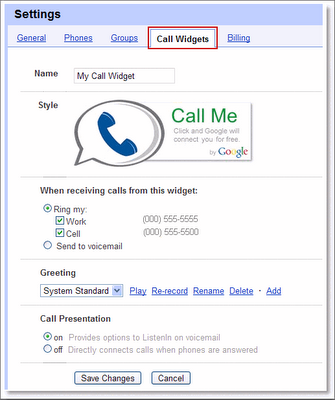 Today's resource of the week is Google's Call Me Widget. This is a free tool from Google that can take your "Contact Me" page to a whole new level. In a nutshell, this tool allows you to place a widget on your website or blog (or Facebook page- see video below), that allows your visitors to call your cell phone or voice mail box without having to show your phone number on your site.
Today's resource of the week is Google's Call Me Widget. This is a free tool from Google that can take your "Contact Me" page to a whole new level. In a nutshell, this tool allows you to place a widget on your website or blog (or Facebook page- see video below), that allows your visitors to call your cell phone or voice mail box without having to show your phone number on your site. In order to use this widget, you'll have to sign up for a free Google Voice phone number. Once you do, you can place the Call Me widget on your site. Visitors can then click on it, enter their phone number, and the widget will either forward the call to the phone number you have associated with your Google Voice account or you can have the call go directly to your voice mail. You can even have a special greeting for your website visitors.
For example, you can set up your Call Me widget to go directly to voice mail with this personal message from you: "This is Tony. Thanks for visiting my blog, Marketing Tips For Authors. I'm really interested in your questions and comments, so please let me know what's on your mind and a way for me to contact you. Have a wonderful day."
I think you can see the marketing potential for this nifty, free tool from Google. One idea: Have readers leave testimonials about your site or your book. You can then embed the audio testimonials for your visitors to listen to.
And for those who wish you could have this on Facebook, Paul DeCarlo has created a Facebook app to do just that. Here's the walk-through video he created to show you how it works on Facebook.
Last 4 Resources Of The Week
Paint.Net
MobiPocket Ebook Creator
YouTube's Creator's Corner
Wikimedia Commons
-------- Tony Eldridge is the author of The Samson Effect , an action/adventure novel that Clive Cussler calls a "first rate thriller brimming with intrigue and adventure." He is also the author of the Twitter marketing book, Conducting Effective Twitter Contests .








Published on May 28, 2011 04:00
May 27, 2011
Book Marketing Strategies And Tips Around The Net: May 27th
 It's Friday, and that means it's time to take a trip around the net to see some of the book marketing posts that have caught my eye this week. So grab your favorite beverage and let's get ready to learn.
It's Friday, and that means it's time to take a trip around the net to see some of the book marketing posts that have caught my eye this week. So grab your favorite beverage and let's get ready to learn.Before we get to the post, I have one quick announcement for our DFW readers. Kat Smith is hosting a Muse Literary Mingle through The Writer's Guild Of Texas next month. I'll be the featured author, and I'd love to meet and chat with you. It will be Tuesday, June 21 from 5:00pm - 8:00pm. For more information, checkout out the flyer on the Facebook event.
Now, on to our trip around the net...
1. Think Like A Publisher #11... Electronic Sales to Bookstores- Dean Wesley Smith starts us off with a brilliant strategy to sell books.
2. How Facebook Led to a Magazine Cover- Dana Lynn Smith shares her story on how Facebook led to a picture on the cover of a magazine along with a 7 page story on her.
3. Getting A Publishing Deal From Your Online Platform With Jim Hopkinson- Joanna Penn interviews Jim Hopkinson and discusses how his platform led to a publishing deal.
4. e-Book Sales on Apple iPhone, iPad, iPod Touch: A 73-Second Seminar- Joel Friedlander shares information on e-book publishing on the iO platform.
5. Dana Lynn Smith Tells How To Entice Libraries to Buy Books- Carolyn Howard-Johnson invites Dana Lynn Smith to share info on selling your books to libraries.
6. But, can you get me on Oprah?- Penny Sansevieri has a fascinating observation on the dream many authors have, or had, of getting on the Oprah Show.
7. Q&A: How to Make Your Author Blog Work For You- BookBuzzr has a Q&A session with Laurel Marshfield, Teresa Morrow and Joel Friedlander on making your blog work for you when it comes to selling your books.
8. Which Links Shared on Twitter Are Mobile Friendly?-
9. 3 Publishing Trends Writers Must Stay On Top Of- Jane Friedman keeps us up on the publishing industry by discussing agents, Amazon, and e-books.
10. How Important Is Your Social Media Profile Photo?- Phyllis Zimbler Miller talks about the importance of your profile picture.
11. 18 things I learned at the Sydney Writers' Festival- Steven Lewis shares some interesting things he learned at the Sydney Writers' Festival.
12. How to get 1 step closer to getting published every day- Roger C. Parker shows you how you can take small steps each day to reach your publishing goals.
13. 18 Articles Help You Master LinkedIn Strategy and Technique- Larry Brauner shares his list of articles to help you formulate your Linked-In strategy.
14. Press Release Tips and Resources by Dana Lynn Smith- Shelley Hitz invites Dana Lynn Smith to share tips on using press releases in your book marketing plan.
15. 10 Things You Need to Know About Self-Publishing- Todd Rutherford discusses 10 things you need to know about self-publishing.
16. 11 questions for the indie publisher: Bob Baker- Sue Collier interviews Bob Baker about his self-publishing experience.
17. What to Do When a Commenter Goes Rogue- Darren Rowse invites Gail Brenner to give advice on what you can do when a commenter gets out of hand.
18. Independent book stores gain ground amid soft real estate market- Steve Weber keeps us up on the publishing industry with some good news for independent book stores.
19. 10 Tips to Becoming an Idea Freak- Chris Antoni gives you 10 ideas on how to come up with ideas for your blog posts.
20. 6 Steps to Craft an Exceptional Blog Post- Daniel Scocco invites Karol K to share his tips on creating great blog posts.
21. Indie Bookstores Boycott Konrath?- Joe Konrath discusses the chatter of some booksellers calling for a boycott of his books for signing with Amazon's new Thomas & Mercer imprint.
22. Why Site Design Should Be Last on Your List- MaAnna Stephenson talks about successful website design elements.
That's it for this week's trip around the net. I'll look forward to seeing you tomorrow morning with another Resource of the Week!
Last 4 Tips Around The Net:
May 20th
May 15th
May 6th
April 30th
-------- Tony Eldridge is the author of The Samson Effect , an action/adventure novel that Clive Cussler calls a "first rate thriller brimming with intrigue and adventure." He is also the author of the Twitter marketing book, Conducting Effective Twitter Contests .








Published on May 27, 2011 06:41
May 26, 2011
What's the Big Deal About Book Covers? By Todd Rutherford
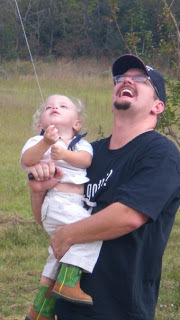 Today, The Publishing Guru is back with another guest post on Marketing Tips For Authors. Todd Rutherford will be talking about the importance of our book covers.
Today, The Publishing Guru is back with another guest post on Marketing Tips For Authors. Todd Rutherford will be talking about the importance of our book covers.What's the Big Deal About Book Covers?
By Todd Rutherford
The cover of your book will often make your first impression with readers. Everyone knows that first impressions are very important. They should be done to the best of the author's ability. Thought and purpose must be given to cover design. Publishers have long known that a book's cover is instrumental to the marketing process. In fact, if the cover of a book fails, so does the book.
Publishers value the investment which goes into the publishing process. For this reason, they pay strict detail to how their books' covers look. The cover represents the author by and large. But it also relates to the publishing company that published it. No publisher wants to be known for poor quality. To ensure this doesn't happen, entire departments are typically devoted to the production of professional appearing book covers.
Traditional publishing companies invest a significant amount for cover design.
As stated before, specific company departments are dedicated to cover design. Here we could have artists, as well as, graphic experts. Their purpose is to produce the best cover for your book that is possible. There are a number of considerations that go into the whole process.
Cover designers use pictures, graphics, and fonts with concerted effort. None of these cover components are done without a purpose. Each is placed and designed in order to yield the best profit. These departments focus on marketing and pride themselves on producing quality covers.
Self publishers must take cover design as seriously as traditional publishers.
Many companies that help authors self publish, have a cover design option. This option allows the author to pick through some standard templates for their cover design. I do not recommend template covers. You want your book to look as good as a New York Time Best Seller.
Prior to participating in this phase of publishing, an author should familiarize themselves with two things. He or she needs to understand basic marketing techniques. How does cover choice connect to the buyer? What colors are distracting? Study the covers of the top ten bestselling books in your genre.
This is important information. The author should also understand what message they are trying to communicate to the reader. The design of the cover will communicate something, whether positively or negatively. The most effective message an author should want to relay is that of their book's theme. Covers shouldn't be chosen because they are liked. They must be chosen for effectiveness as well.
Independent designers will happily produce the cover you want.
Some authors have a specific cover idea in mind, but need help bringing it to life. For this reason, there are many independent graphic design companies. These companies offer a variety of services, some of which include cover design. Working with this type of service doesn't have to be expensive. It may, however, be the best way to ensure that your idea is communicated through your book's cover.
Designers work to make your idea a reality, and then send you a completed file. Sometimes these projects have to be worked on over time. They can take months in some cases. Once completed, this file can be used to create the book cover you've always wanted.
--------
Need help with writing, editing, publishing, or book marketing? AskthePublishingGuru.com
Related Posts
Building a Global Author Platform with Social Media By Todd Rutherford
E-Book Cover Service Creates Twitter Contest Book Cover
Logos, E-book Covers, And More With 99Designs
Review: A Self-Publisher's Companion by Joel Friedlander
-------- Tony Eldridge is the author of The Samson Effect , an action/adventure novel that Clive Cussler calls a "first rate thriller brimming with intrigue and adventure." He is also the author of the Twitter marketing book, Conducting Effective Twitter Contests .








Published on May 26, 2011 04:00























